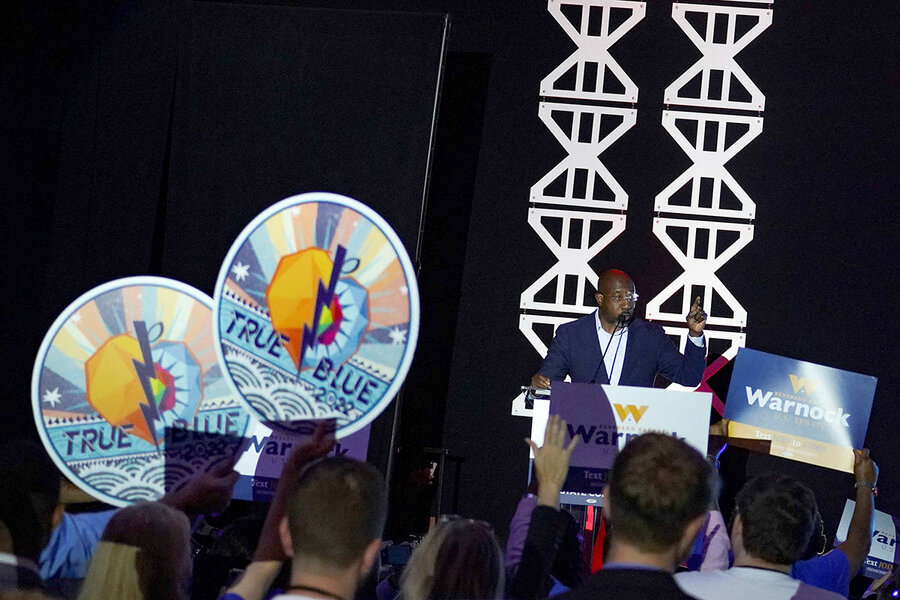Why Democrats suddenly feel they might defy history, hold Senate
Loading...
| Washington
Not long ago, Democrats seemed resigned to historical precedent – that the president’s party almost always loses House and Senate seats in midterm elections.
The telltale signs were there: An unpopular president. Soaring inflation. The public in a sour mood.
Why We Wrote This
Historically, the clear pattern is for a president’s party to lose ground in midterm elections. This year, wild-card forces go beyond politics as usual, including voters’ rising engagement on abortion.
But a funny thing has happened on the way to the “shellacking” of 2022: It might not materialize.
A confluence of factors is making control of the Senate more competitive – from an improvement in gas prices to the Supreme Court’s overturning of nationwide abortion rights, an animating issue for Democrats and many independents.
Then there’s “candidate quality,” as Senate Republican leader Mitch McConnell put it, referring to struggling GOP nominees in battleground states, many of whom were endorsed by former President Donald Trump.
The closely divided House still seems likely to go Republican on Nov. 8, but by a slimmer margin than once expected.
“The dynamic of midterms is [usually] very strong. People who are unhappy turn out to vote, and usually it’s folks not in the president’s party,” says Stuart Rothenberg, a veteran political analyst. But “clearly, over the past few weeks, there’s been a surge in Democratic enthusiasm compared with six months ago.”
Not long ago, Democrats seemed resigned to historical precedent – that the president’s party almost always loses House and Senate seats in midterm elections, sometimes a lot.
The telltale signs were there: An unpopular president. An economy out of whack, with soaring gas prices and high overall inflation. The public in a sour mood. Given Democrats’ extremely narrow control of each chamber, a Republican sweep seemed all but certain.
But a funny thing has happened on the way to the “shellacking” of 2022: It might not materialize.
Why We Wrote This
Historically, the clear pattern is for a president’s party to lose ground in midterm elections. This year, wild-card forces go beyond politics as usual, including voters’ rising engagement on abortion.
The closely divided House still seems likely to go Republican on Nov. 8, albeit by a slimmer margin than once expected. But the Senate – currently at 50-50, with the Democratic vice president breaking tie votes – has turned into a nail-biter.
Senate Republican leader Mitch McConnell said as much recently, predicting an “extremely close” result, with either party conceivably winning a majority. “Candidate quality has a lot to do with the outcome” in Senate races, he said, a slap at struggling GOP nominees in key states – and by extension, at former President Donald Trump, who endorsed them.
A confluence of factors is making control of the Senate more competitive. In addition to weak Republican candidates, there’s been an improvement in gas prices, a GOP campaign cash crunch, and the Supreme Court’s overturning of nationwide abortion rights, an animating issue for Democrats and many independents. Some states have seen a surge in women registering to vote after the high court ruling.
“The dynamic of midterms is [usually] very strong. People who are unhappy turn out to vote, and usually it’s folks not in the president’s party,” says Stuart Rothenberg, a veteran political analyst. But “clearly, over the past few weeks, there’s been a surge in Democratic enthusiasm compared with six months ago.”
The political forecasters at FiveThirtyEight now rate Democrats as “slightly favored” to win the Senate. Under the firm’s model, Democrats win the Senate majority in 65 out of 100 simulations. The nonpartisan Cook Political Report recently shifted its Senate forecast to “toss-up.”
The shift on abortion
The latest Pew Research Center poll finds that while the economy remains the top voting issue, abortion has grown in significance. Some 56% of registered voters now say abortion will be “very important” in their midterm vote, up from 43% in March. The increase was driven by Democrats, the poll finds.
Pew has President Joe Biden’s job approval rating at just 37%, but a declining share of voters say that he will be a factor in their midterm vote. Furthermore, both the FiveThirtyEight and Real Clear Politics averages of major polls show President Biden’s approval rising steadily in recent weeks to 42%.
Democrats also point to recent votes as encouraging signs. In deep-red Kansas, voters resoundingly defeated an anti-abortion referendum to amend the state constitution. And a special House election in a toss-up district in New York went Democratic. Of course, a referendum and a House race are not predictive of Senate elections, but they did show an ability to motivate voters.
Another factor helping Democrats is the “map.” In this cycle, they are not defending any Senate seats in states won by former President Trump in 2020.
Democrats acknowledge their Senate prospects may grow cloudier again between now and November. But they are seizing on the current momentum and running with it. Last Thursday, at a rally in suburban Maryland, Mr. Biden went on the offensive, accusing former President Trump’s party of “semi-fascism.”
Even if Democrats lose the House, thwarting Mr. Biden’s ability to pass major legislation come January, keeping a Senate majority would still matter greatly. It would make confirming nominees much less fraught – most consequentially, a new Supreme Court justice, if a vacancy were to occur.
The Trump factor
One X-factor lurking in the wings is Mr. Trump himself. In July, he was reportedly telling advisers he might announce a 2024 presidential bid before the midterms, to shore up support in his political base and stave off potential GOP rivals.
The FBI’s search of Mr. Trump’s Mar-a-Lago estate earlier this month might have done that work for him. Top Republicans, including some clearly eyeing 2024, rallied around the former president. And while his overall favorability among Republicans didn’t change after the Mar-a-Lago search, an Economist/YouGov poll showed a 12-percentage-point boost in Republicans who view him “very favorably.”
But it’s not clear how long the rally effect will last, and there’s no guarantee that Mr. Trump will listen to advisers who think announcing for 2024 before the midterms is a bad idea. One of their concerns is that if Republicans underperform in November, he will be blamed.
Democrats sound downright gleeful over the idea of Mr. Trump announcing pre-Nov. 8.
“I can only hope he follows through on that threat,” says Jim Manley, a former spokesperson for the late Democratic Senate Majority Leader Harry Reid.
That would turn the campaign from a referendum on Mr. Biden to a quasi-rerun of the 2020 presidential race – but with the knowledge of everything that has happened since, including the Jan. 6, 2021, siege of the U.S. Capitol by Trump supporters.
Mr. Trump’s endorsements have already had a major impact on 2022. He clearly helped Mehmet Oz win the GOP Senate primary in Pennsylvania, where now even many Republicans say privately that the celebrity TV doctor is running a bad campaign. If Dr. Oz loses the race, that’s a Democratic takeover of a seat currently held by a retiring Republican.
Two other Trump Senate endorsees are trailing freshman Democrats in battleground states that should be winnable. One is Herschel Walker of Georgia, a former football star and, like Dr. Oz, a first-time candidate. He brings personal baggage to the race, is prone to gaffes, and is polling much worse than other Republicans on the ballot, such as Gov. Brian Kemp.
The other is venture capitalist Blake Masters of Arizona, another political novice, who claims the 2020 election was stolen. Political analysts say a stronger GOP nominee would have been Gov. Doug Ducey, but he declined to run after crossing Mr. Trump and certifying the state’s 2020 election result.
The Cook report rates another Trump endorsee, two-term Wisconsin GOP Sen. Ron Johnson, as a toss-up for reelection based on his low approval ratings and “a history of saying false things,” as the Cook report put it, about COVID-19 and Jan. 6. But the Democratic nominee, Lt. Gov. Mandela Barnes, may be too progressive for this purple state.
And in red-leaning Ohio, author and novice candidate J.D. Vance – who surged to the GOP nomination after his Trump endorsement – is underperforming in the race for an open Senate seat. When the campaign fell short on cash, a major super PAC (political action committee) came to the rescue.
In the vein of “what might have been,” Republican strategists are looking wistfully at New Hampshire, where popular, moderate GOP Gov. Chris Sununu declined to run against vulnerable Democratic Sen. Maggie Hassan. Instead, the leading GOP candidate heading into the state’s Sept. 13 primary is retired Gen. Donald Bolduc, who promotes false election conspiracies.
Republicans do have strong candidates in other competitive Senate races, starting with Nevada, against Sen. Catherine Cortez Masto. GOP nominee Adam Laxalt, former state attorney general and grandson of a beloved Nevada political figure, was endorsed by Mr. Trump. In 2020, Mr. Laxalt tried to overturn Mr. Biden’s election victory in the state, claiming the election was “rigged.” Now, he’s reassuring Nevadans that their votes will count. Analysts say he’s walking a political tightrope, but still see this race as the GOP’s top takeover shot.
Then there’s Colorado, a blue state in presidential politics, whose Senate race was not on Washington’s political radar until recently. Now it’s seen as competitive. The Republican nominee, businessperson and political newcomer Joe O’Dea, is a moderate who supports abortion rights, with limits. Mr. Trump made no endorsement in the primary.
The incumbent, Democratic Sen. Michael Bennet, is fighting back, and making abortion the centerpiece of his campaign. But Dick Wadhams, a longtime Republican strategist in Colorado, thinks Mr. O’Dea could pull off an upset. He says Colorado voters, 46% of whom are politically unaffiliated, are willing to look beyond party labels and see candidates as individuals.
Still, he says, referencing Dr. Oz and Mr. Walker, “Republicans are in a vulnerable position” in their effort to retake the Senate.









